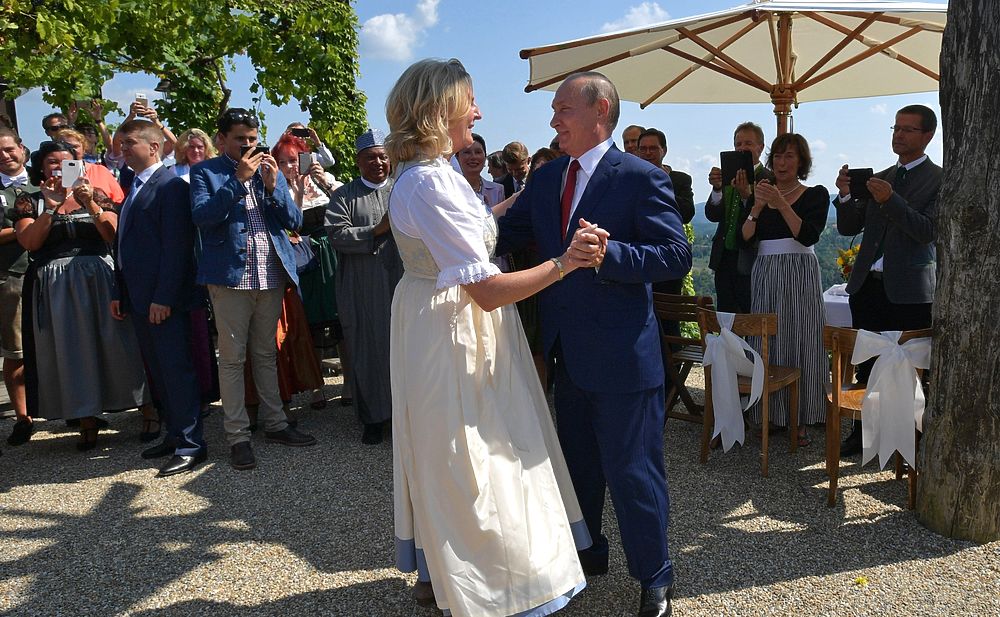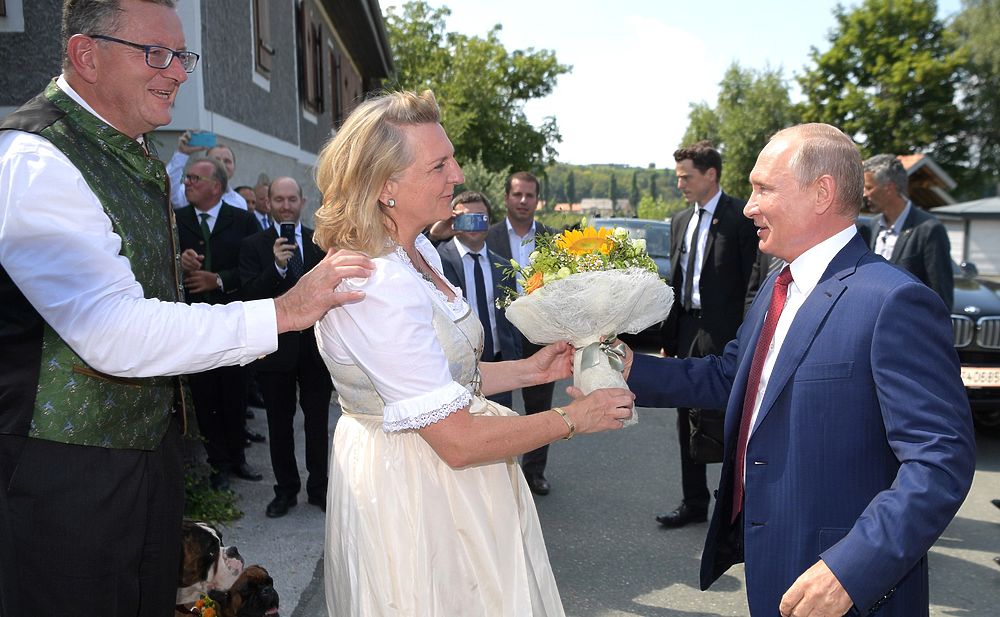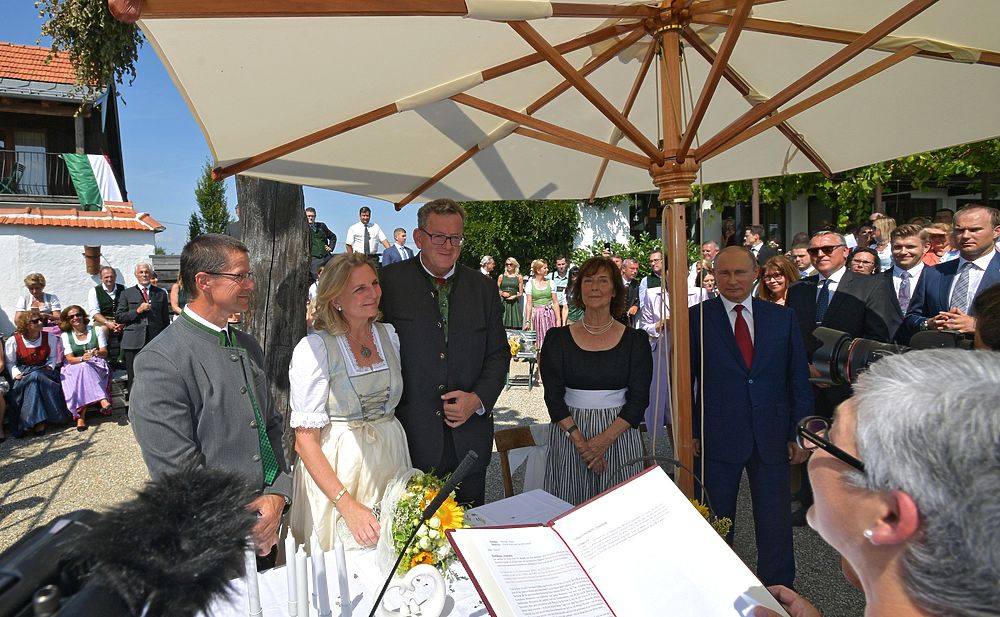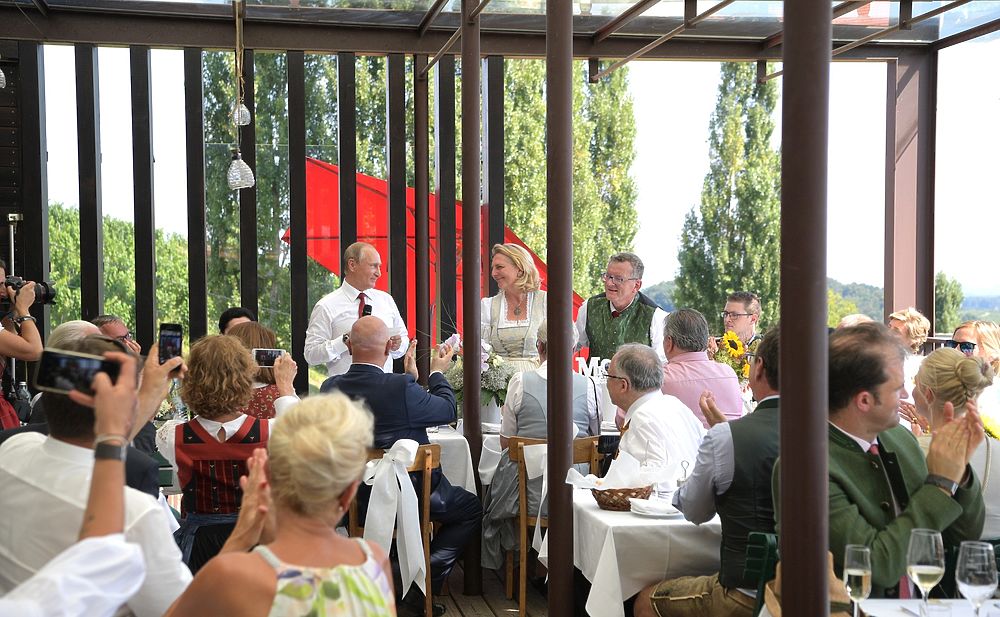"Russia In The World" is a MEMRI Russian Media Studies Project review of Russia's geopolitical interests and areas of penetration. This installment will deal with Russia-Austria relations.

(Source: Kommersant.ru)
On August 18, Russian President Vladimir Putin attended the wedding of Austrian Foreign Minister Karin Kneissl, in Austria’s Styria region. He then flew to Berlin, the same day, for talks with German Chancellor Angela Merkel.
Putin's attendance at Kneissl's wedding was reported on the Kremlin website,[1] making it more than a personal visit. During the wedding, Putin appeared to be a guest of honor; he danced with the bride, gave a speech during the wedding luncheon, and conducted a brief conversation with Austrian Chancellor Sebastian Kurz, who was also in attendance.
Kneissl, an independent, has been Austria's Foreign Minister since December 2017, and owes her appointment to the populist Freedom party (FPÖ), the junior party in Austria’s ruling coalition.
Austria's vice chancellor Heinz-Christian Strache, who heads the FPÖ, has been critical of EU sanctions against Moscow. On June 3, 2018, Strache told the newspaper Oesterreich in an interview: "It is high time to put an end to these exasperating sanctions and normalize political and economic relations with Russia."[2]
It is worth noting that Austria did not expel Russian diplomats, as other EU countries did, in response to the poisoning of former Russian military intelligence officer and British spy Sergei Skripal. Commenting on the matter, Foreign Minister Kneissl said: "We've come across an incident, the circumstances of which require investigation... We've never practiced expulsion of diplomats because diplomacy means something bigger than reciprocal memorandums, it means working over nuances."[3]
On June 5, 2018, on his first visit to an EU member country since his reelection, Putin paid a one-day visit to Austria. The visit marked the 50th anniversary of the first contract on natural gas supplies from the Soviet Union to Austria.
It is also worth noting that on July 1, 2018, Austria took over the Presidency of the Council of the European Union for a period of six months.
Below is an overview of reactions in the Russian media to Putin's attendance at Foreign Minister Kneissl's wedding:

(Source: Kommersant.ru)

(Source: Kommersant.ru)

(Source: Kommersant.ru)
Russian Expert Mirzayan: Putin's Visit Debunks The Rumors Of Russia's "Personal" Isolation
Gevorg Mirzayan, Associate Professor at the Department of Political Science of the Financial University under the Government of the Russian Federation, wrote in the Russian media outlet Expert.ru:
SUPPORT OUR WORK

"Ostensibly, the Russian president came to Austria to rest. Or, more precisely, to be a guest of honor at the wedding of Karin Kneissl, the Minister of Foreign Affairs – as a 'wedding president' [figurehead] of sorts – a rare kind of a guest, it goes without saying. One should not, however, underestimate the importance of this trip; it is filled with plenty of meanings, tasks, and significance.
"Austria is trying, as it has done before, to play the role of a bridge between Europe and Russia, maintaining all the while a pragmatic attitude towards Moscow. Thus it refused, against the backdrop of the general madness around the 'Skripal affair,' to expel Russian diplomats, and directly opposed the pressure on this issue from London.
"At the same time, Vienna seeks to play the role of a leader, a respectable focal point of conservative forces in Europe (not only Central and Eastern Europe, but Western Europe as well). And so Vladimir Putin, by way of demonstrating his special relations with the 'young and promising' Chancellor Sebastian Kurz, helps to some extent to make this complex task real.
"[Putin is doing this] not only with the current visit alone, but the previous steps as well. Austria was the first country Putin visited after his inauguration, and it was Vienna that was seen, along with Helsinki, as a candidate venue for the summit with Trump.
"Furthermore, we should remember that Karin Kneissl not only advocates for normalizing relations with Russia, but that she was also nominated for the post of foreign minister by the Freedom Party, which is in favor of lifting the sanctions on Russia.
"In addition, Putin's visit debunks the rumors of Russia's 'personal' isolation. Having resigned themselves to the fact that important issues cannot be resolved without Moscow, Russophobes have put forth the idea that 'civilized countries' are only prepared to conduct business with the Russian president – but never to invite him to respectable houses in Europe. But it would be difficult to find more respectable houses in Europe than those in Vienna."
(Expert.ru, August 19, 2018)
Columnist Akopov: As In The Past, Personal Ties Have Become Important To Shape The Political Process
Columnist Petr Akopov wrote for the Russian media outlet Vzlyad.ru:
"In earlier times, our leaders' attendance at weddings in Europe was not surprising or exceptional. It happened [regularly] a century ago, and had to do with family ties. The last time a Russian Tsar attended a wedding [in Europe] was in May 1913. This was the wedding of German Emperor Wilhelm II's daughter and Prince Ernst August Hanover, when the three cousins who started a war a year later – the German Kaiser, the Russian Tsar, and the King of England – came together for the last time...
"Putin's attendance at the wedding in Styria lifts a curtain on an otherwise concealed side of the political process – personal relations among political leaders. Our president does not hide his firm personal relations with some European politicians – Gerhard Schroeder or Silvio Berlusconi, for example. Schroeder would attend Putin's birthday parties, which were usually only for the closest circle.
"Now we see Putin being invited to the wedding of the Austrian foreign minister – a woman who may challenge not only Atlantic policy, but also [may stand against] the whole campaign of demonizing Putin, which is being promoted among the Europeans by globalist circles. Karin [Kneissl] is not only a clever woman, she is also a brave woman."
(Vz.ru, August 15, 2018)
Russian Expert Bystritsky: The Invitation Was Dictated By A Genuine Sympathy
Expert of the International Valdai Discussion Club Andrey Bystritsky opined: "We live in a political world, an internationally political one even, where everything is symbolic, and this is definitely a symbol. When the Austrian foreign minister invited a president of one of the world’s leading countries, it is, of course, a sign. A private sign, but still, it remains a sign."
He also added: "What it means - reconnaissance, an attempt to have an informal conversation, predict what would happen in the future, discuss certain details - we cannot say for sure. However, it is absolutely clear that the invitation to the wedding was dictated by a genuine sympathy or a desire to talk… It holds special significance that the wedding takes place before the meeting [of Vladimir Putin] with Angela Merkel."
Bystritsky then concluded: "European politicians are actually rather reasonable people. They are also looking for a way to change the situation in the world, to create a new configuration. Overall, currently we are seeing a process that consists of different elements on very different levels. We can call this process a formation of a new world order, or at least a new relations system."
(Tass.com, August 18, 2018)
Appendix I – Video Of The Wedding
Putin went to the wedding with the Kuban Cossack Chorus, to entertain the guests.
The video shows Putin dancing with Kneissl to "The Last Waltz," and congratulating the newlyweds in German.[4]

View the full video here
[1] See En.kremlin.ru/events/president/news/58327, August 18, 2018.
[2] See MEMRI Special Dispatch No. 7516, Russia In The World – Russia-Austria Relations – Russian Expert Danilov: Russia Is Not Isolated, June 11, 2018.
[3]See MEMRI Special Dispatch No. 7516, Russia In The World – Russia-Austria Relations – Russian Expert Danilov: Russia Is Not Isolated, June 11, 2018.
[4] See Heute.at/politik/news/story/Karin-Kneissl-Hochzeit-Wladimir-Putins-Ansprache-auf-Deutsch-im-Wortlaut-54755673, August 20, 2018.




